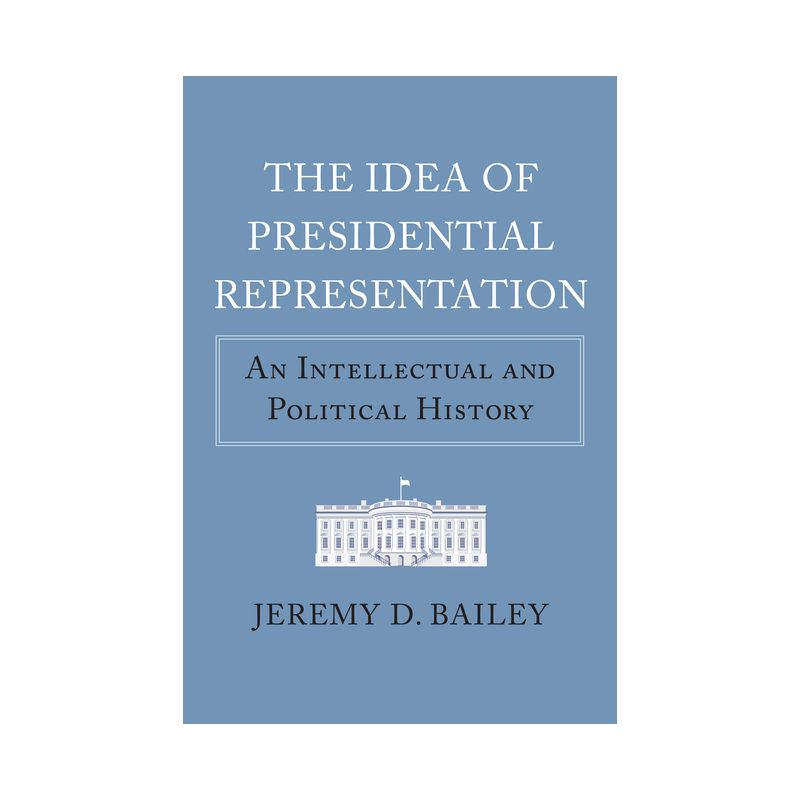Sponsored
The Idea of Presidential Representation - (American Political Thought) by Jeremy D Bailey (Hardcover)
Sponsored
About this item
Highlights
- Does the president represent the entire nation?
- Author(s): Jeremy D Bailey
- 272 Pages
- Political Science, American Government
- Series Name: American Political Thought
Description
About the Book
Jeremy Bailey illuminates the tensions that inhere in the republican idea of the executive: the president is understood to be both a defender of the law and a representative of popular will. Covering the whole of American political development, this book reveals that these dueling conceptions of the presidency date to the founding itself.Book Synopsis
Does the president represent the entire nation? Or does he speak for core partisans and narrow constituencies? The Federalist Papers, the electoral college, history and circumstance from the founders' time to our own: all factor in theories of presidential representation, again and again lending themselves to different interpretations. This back-and-forth, Jeremy D. Bailey contends, is a critical feature, not a flaw, in American politics. Arriving at a moment of great debate over the nature and exercise of executive power, Bailey's history offers an invaluable, remarkably relevant analysis of the intellectual underpinnings, political usefulness, and practical merits of contending ideas of presidential representation over time. Among scholars, a common reading of political history holds that the founders, aware of the dangers of demagogy, created a singularly powerful presidency that would serve as a check on the people's representatives in Congress; then, this theory goes, the Progressives, impatient with such a counter-majoritarian approach, reformed the presidency to better reflect the people's will--and, they reasoned, advance the public good. The Idea of Presidential Representation challenges this consensus, offering a more nuanced view of the shifting relationship between the president and the American people. Implicit in this pattern, Bailey tells us, is another equivocal relationship--that between law and public opinion as the basis for executive power in republican constitutionalism. Tracing these contending ideas from the framers time to our own, his book provides both a history and a much-needed context for our understanding of presidential representation in light of the modern presidency. In The Idea of Presidential Representation Bailey gives us a new and useful sense of an enduring and necessary feature of our politics.Review Quotes
"Historians should continue to explore the path that Bailey has so brilliantly illuminated."--American Historical Review
"Jeremy Bailey's excellent book is an important contribution to political science and history. Through its conceptual lens we recognize how the parties have used representational and constitutional arguments."--Review of Politics
"With extensive analyses of both well-known and obscure texts, Bailey has made a strong case for the importance of this 'enduring debate.' His account is likely to become one of the core texts on the history of the presidency."--Perspectives on Politics
"The strengths of this book are its rich detail, its accessibility, and the importance this historical lens offers under the current administration. It is a good historical look at the development of presidential power. Highly recommended."--Choice
"This is an outstanding and important book. Professor Bailey challenges many of our conceptions of presidential representation. Taking his bearings from an intense engagement with history on its own terms, Bailey uncovers conceptions of presidential representation that are lost to us when we begin from our current account of it. Bailey combines political science with history to produce a truly magnificent book that will be of significant interest to historians, political scientists, and legal scholars."--Benjamin A. Kleinerman, author of The Discretionary President: The Promise and Peril of Executive Power
"The Idea of Presidential Representation is a major scholarly achievement. Jeremy Bailey's analysis illuminates the tensions that inhere in the republican idea of the executive: the president is understood to be both a defender of the law and a representative of popular will. Covering the whole of American political development, this book reveals that these dueling conceptions of the presidency date to the founding itself. Bailey's careful scholarly eye and diligent research will overturn the prevailing consensus that the idea of the president as a popular representative of the people is the twentieth-century invention of progressives like Woodrow Wilson."--George Thomas, Burnet C. Wohlford Professor of American Political Institutions, Claremont McKenna College
"Presidents claim to be the only nationally elected constitutional officer. Jeremy Bailey shows that while the president's place in the constitutional order has been set since the founding, the understanding of the president as a representative has not been static. Original, probing, and provocative, Bailey's history of the idea of presidential representation offers a new window on the entire history of presidential politics."--Jeffrey K. Tulis, associate professor of government, University of Texas at Austin
"Jeremy Bailey has written a learned book that offers new insights into the fraught relationship between the Constitution and the presidency. The idea of presidential representation, he shows, has been contested from the earliest days of the republic--a debate that resonates through our own disruptive political time. This enduring struggle between those who view the president as wielder of executive power and those who champion the executive office as the vanguard of popular opinion has animated a vital debate about the meaning of self-government and, at least to this point in our history, defied a dangerous joining of executive prerogative and populism."--Sidney M. Milkis, author of Theodore Roosevelt, the Progressive Party, and the Transformation of American Democracy
Additional product information and recommendations
Sponsored
